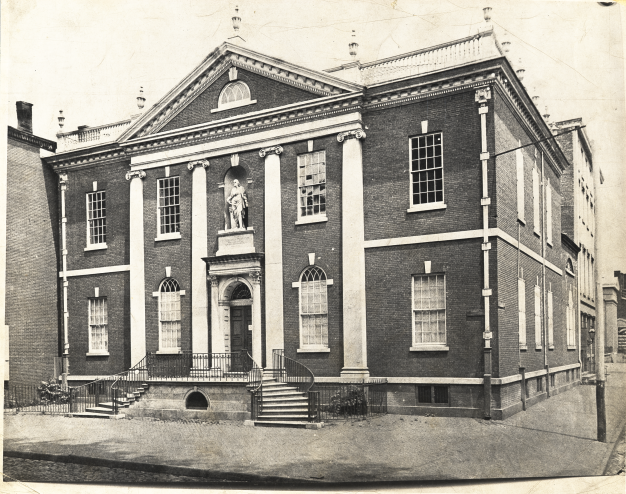Two of Franklin’s Institutions Look to a Future of Greater Collaboration
The American Philosophical Society and the Library Company of Philadelphia, two eminent institutions based in Philadelphia, were founded by Benjamin Franklin to improve society through the advancement of knowledge. Recently, they have begun to explore the possibility of a closer formal relationship while retaining each institution’s distinct identity. They have entered these exploratory conversations guided by their history and shared missions. Their aim is to find ways to increase awareness of their valuable and complementary historic and contemporary collections, to improve access to them, to better support the research process, and to serve the community more fully.
The origins of both institutions date to one of Franklin’s first civic initiatives: the Junto. In 1727, Benjamin Franklin founded the Junto, an informal group of Philadelphians who shared a desire to improve themselves through education and the exchange of knowledge.
In 1731, as the Junto’s success grew, Franklin and other civic-minded Philadelphians founded the Library Company of Philadelphia, the first successful lending library in the Americas. They did so to create for Philadelphians what the Junto had been for its members: a way for Philadelphians to have access to the best new knowledge and to improve their own lives and their community.
In 1743, and in the same spirit that had motivated both the Junto and Library Company, Benjamin Franklin, again with like-minded compatriots, founded the American Philosophical Society with the mission of “promoting useful knowledge.” The APS applied the same vision that inspired the Junto on a larger scale, creating a center of learning through which British North American colonists, later United States citizens, could share their latest discoveries with each other and with the rest of the world.
In 1789, the same year that the Constitution took effect, the APS and LCP undertook their own grand endeavors, both deciding to build large homes on Fifth Street near Independence Hall. The APS sat on the west side of the street, opposite the Library Company on the east side. Their proximity was no mistake. The idea was that the nation’s great center of knowledge production could sit opposite the nation’s greatest library, and the two would create a symbiotic relationship that would strengthen the foundations of the young country.
In the two centuries since, these institutions have remained close and consistent collaborators. Given the strength of their historical ties, the list of initiatives undertaken collaboratively is too long to enumerate in its entirety. Recent examples include major joint exhibitions in 1976 to mark the bicentennial of Independence, in 1987 to mark the bicentennial of the Constitution, and in 2006 to mark Franklin’s Tercentenary. Now, in anticipation of 2026, they are among the founding partners of The Revolutionary City: A Portal to the Nation’s Past, a unified digital repository for Philadelphia-area collections that documents Philadelphia’s history during the American Revolution.
As the nation nears its 250th anniversary, the LCP and APS are exploring how they can build on this interwoven history and more closely collaborate in the same spirit that led to their founding and has subsequently guided their missions. Their goal remains as always: to steward collections to the highest of standards, to encourage research through open access to these materials, and to promote new discoveries, all of which are done to improve the community and world through the production and dissemination of new knowledge.
About the LCP and APS
The Library Company, founded in 1731 as the first subscription library in the British colonies, has vast holdings of rare books, manuscripts, graphic works, and art and artifacts. It also supports public programs, research centers, and fellowships.
The American Philosophical Society, the oldest learned society in the United States, was founded in 1743 for the purpose of “promoting useful knowledge.” It is a multifaceted organization comprising a research library, museum, scholarly press, public programs, grants and fellowships, and a venue for the semi-annual meetings of its elected members.
Both institutions are founding members of the Independent Research Libraries Association.
Contacts:
Robert M. Hauser
Executive Officer
American Philosophical Society
[email protected]
215-440-3435
John C. Van Horne
Interim Director
Library Company of Philadelphia
[email protected]
215-546-3181
Image: Original building of the Library Company, now the site of the American Philosophical Society's Library, photograph approximately 1882.

